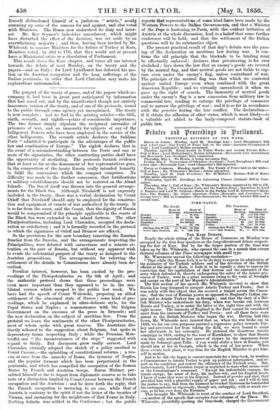The purport of the treaty of peace, and of the
papers which ac- company it, had been in great part anticipated by information that had oozed out, and by the unauthorized though not entirely inaccurate version of the treaty, and of one of the protocols, issued to the public through some agency yet unexplained. The treaty is now complete ; and we find in the missing articles—the fifth, sixth, seventh, and eighth—points of considerable importance.. The two former simply stipulate the reciprocal surrender of prisoners of war, and an immunity for subjects of any of the belligerent Powers who have been employed in the service of the other belligerents. The seventh article declares the Sublime Porte "admitted to participate in the advantages of the public Jaw and combination of Europe." The eighth declares that in the event of a misunderstanding between the Porte and one or more of the signataries, the other contracting parties shall have the opportunity of mediating. The protocols furnish evidence that at least so far as the demeanour of her representatives goes, in the composition of the treaty Russia really intended honestly to fulfil the concessions which the compact comprises. No difficulty was made in the further concession, that fortifications or military establishments should not be restored on the Aland Islands. The Sea of Azoff was thrown into the general arrange- ments for the Black Sea. Although Nicolaieff is not expressly included in the treaty, there was a verbal declaration by Count Orloff that Nicolaieff should only be employed for the construc- tion and equipment of vessels of war authorized by the treaty. It is so far from the coast, said the Count, that the dignity of Russia would be compromised if the principle applicable to the coasts of the Black Sea were extended to an inland fortress. The other Plenipotentiaries, including Lord Clarendon, accepted the decla- ration as satisfactory ; and it is formally recorded in the protocol to which the signatures of Orloff and Brunow are affixed.
So the provisions for the new boundary removing the Russian frontier from the Danube and the arrangements respecting the Principalities, were debated with earnestness and a minute at- tention on the part of Russia, but without any apparent wish to evade the substantial purport of the treaty as designed in the Austrian propositions. The arrangements for referring the settlement of the details to Commissions have already been de- scribed.
Peculiar interest, however, has been excited by the pro-
ceedings of the Plenipotentiaries on the 8th of April ; and•the authentic protocol shows that those proceedings were
even more important than they appeared to be in the mu- tilated version which escaped to the public last week. We have had the speech of Count Wakwski, proposing an allied settlement of the abnormal state of Greece ; some kind of pro- ceedings, which he explained in ultra-delicate style, for the Papal States and Naples ; a remonstrance with the Belgian Government on the excesses of the press in Brussels ; and the new declaration on the subject of maritime law. From the protocol we learn the sentiments of the other Plenipotentiaries, most of whom spoke with great reserve. The Austrians dis- tinctly adhered to the suggestion about Belgium, but spoke in deprecatory terms respecting Italy ; while the Prussian Man- teuffel saw "the inconveniences of the steps" suggested with regard to Sicily. But discussion grew really earnest. Lord Clarendon virtually adopted the sketch of a policy ascribed to Count Cavour,—the uphold ing of constitutional reforms ; a res- cue at once from the anarchy of Rome, the tyranny of Naples, and the popular ferment which has been perpetuated in the peninsula, and which has compelled the occupation of the Roman States by French and Austrian troops. Baron Hubner per- mitted himself so far to depart from diplomatic reserve as to take note of a distinction implied by Count Cavour between the French occupation and the Austrian ; and he drew forth the reply, that the French occupation is menacing to no one, while that of Austria is contrary to the spirit if not the letter of the treaties of Vienna, and menacing for the neighbours of that Power in Italy. Nothing definite was settled in the Conference ; but the public
reports thatrepresentations of some kind lave been made by the Western Powers to the Italian Governments, and that a Minister of the Pope is hastening_ to Paris, with the evident irritation of Austria at the whole discussion, lead to a belief that some further conference will be held, and that the settlement of the Italian questions will be its substantive object.
The present practical result of that day's debate was the pass- ing of the declaration on maritime law during war. It con- firms the old principle that the blockade to be binding must _ be effectually enforced ; declares that privateering is for ever abolished ; lays down the law that an enemy's goods are covered by the neutral flag, and that neutral goods are not liable to cap tore even under the enemy's flag, unless contraband of war. The principle of the neutral flag was that which we contested against united Europe even when combined with the great American Republic ; and we virtually surrendered it when we gave up the right of search. The immunity of neutral goods under the enemy's flag is a new concession from military law to commercial law, tending to enlarge the privilege of commerce and to narrow the privilege of war ; and it is so far in accordance with the practice during the late conflict. The declaration— if it obtain the adhesion of other states, which is most likely—is a valuable act added._ to the laxly-composed statute-book of public law.






































 Previous page
Previous page